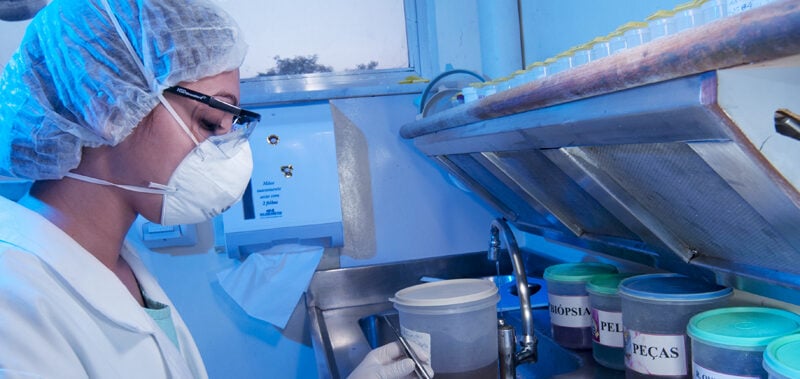Prolonged Covid is characterized by the persistence of one or more symptoms of the disease four weeks after infection.
ADVERTISING
There are three other risk factors for persistent symptoms:
- Be woman. Women are 21% more at risk of having long Covid than men. Other studies need to be carried out to identify whether the causes are biological or behavioral factors.
- Number of infections. Having two or more infections increases the chance of persistent symptoms by 27%.
- Variant of the infection. In comparison with the strains that circulated in 2020, the first year of the pandemic, the Gamma variant represented more risk for long Covid and the Delta and Ômicron variants, less so.
“The data shows the importance of the fourth dose in the vaccination schedule against Covid-19. Anyone who is incompletely vaccinated needs to complete it as quickly as possible”, says Vanderson Sampaio, researcher responsible for data analysis at ITpS.
“Another important result is that successive infections increase the risk of developing a prolonged form of the disease. This reinforces the need to continue with prevention measures, such as masks, hand hygiene and preference for ventilated places.”
ADVERTISING
Researchers from ITpS and Einstein compared data from infected healthcare professionals and other hospital employees who had long Covid before being vaccinated, with those who reported symptoms after the first, second, third and fourth doses of the vaccine.
The fourth dose reduced the chances of long Covid by 95% compared to the unvaccinated group.
In the group vaccinated with one, two or three doses, no significant reduction in risk for the disease was observed. long covid.
ADVERTISING
Research
Data was collected from 18.340 healthcare professionals, from March 1, 2020, to July 15, 2022. Of these, 7.051 had Covid-19 during the period, with 5.118 (72,6%) not reporting any symptoms of long Covid.
Of the 1.933 individuals who reported persistent symptoms (27,4% of the total), the majority (51,8%) had three or more.
Variables such as sex, age, body mass index, physical activity (more or less than 30 minutes per day), reported hypertension, diabetes, arthritis, chronic kidney disease, stroke, cancer, type of work, number of vaccine doses were included. received, vaccination schedule (homologous or heterologous, a booster dose different from previous doses), number of infections and SARS-CoV-2 variant.
ADVERTISING
“In addition to having shown that a large number of healthcare professionals were exposed to the virus and that many develop the so-called long Covid, the most interesting thing is that we have demonstrated the protective power of the two booster doses. It is important that there are new studies and that public authorities base their action strategies on this scientific evidence”, says Alexandre Marra, researcher at Einstein and first author of the work.
For Luiz Vicente Rizzo, senior author of the new study and research director at Einstein, with the importance that covid-19 has for global health, many studies will still be needed in order to understand the disease and defeat it.
“This work is another piece in the great Covid-19 puzzle. With billions of people affected, a multitude of vaccines and adoption of very different measures by different countries, there are variables that need to be understood. Only in this way will we be able to deal with the new waves and variants and the consequences left by the infection. It is to be expected that, among patients, there will be subgroups that are more or less affected, and whose behavioral and biological markers need to be determined. Only scientific research can bring reliable answers that will serve to improve the care of these people and also to better use the inputs we have.”
ADVERTISING
In addition to Vanderson Sampaio, scientific researchers Mina Ozahata and Rafael Lopes Paixão participated in the ITpS analyses.
Clinical Hospital
Looking for protective or risk factors for the development of long Covid, ITpS also worked with researchers from Faculty of Medicine of the University of São Paulo, using samples from vaccinated healthcare professionals at the Hospital das Clínicas of FMUSP, the Federal University of Rio de Janeiro and the Pontifical Catholic University of Campinas.
Even more robust associations were also found between a higher risk of long Covid and the fact that the patient was a woman (twice the risk of a man), had reinfection (twice the risk from the second infection) and severity of the disease.
Of those infected with SARS-CoV-2 who described persistent symptoms lasting more than four weeks after infection, 79% reported fatigue, 71% persistent cough, 67% difficulty concentrating, 65% headache, 63%, myalgia and arthralgia, and 55%, memory loss.
The Cohort of Vaccinated Health Professionals group from the FMUSP Hospital das Clínicas, coordinated by Silvia Figueiredo Costa, associate professor at the institution's Department of Infectious and Parasitic Diseases, followed 1.540 patients infected by SARS-CoV-2 in two periods, from September 2020 to December 2021 and from January 2022 to October of the same year.
“Because we have a dynamic study, we were able, over the months, to include new cases of long Covid and evaluate the impact of booster doses, the circulation of new variants and reinfections”, says Silvia.
Covid-19 Cohort Network
In the first half of 2022, ITpS and nine research groups began structuring a network of population studies on Covid-19 in Brazil. The objective is to work in a network, sharing data and joining efforts in a collaborative science model, in order to obtain information about populations vaccinated against SARS-CoV-2 and also recovered from covid-19 that can guide strategic decision-making in public health.
“Networking with groups that follow cohorts of well-studied patients allows access to a large number of quality data, enabling analyzes that answer important questions for public health decisions”, says the CEO of ITpS, Jorge Kalil.
In Partnership with Curto News and ITpS
See also:

Receive news and newsletters do Curto News by Telegram e WhatsApp.




